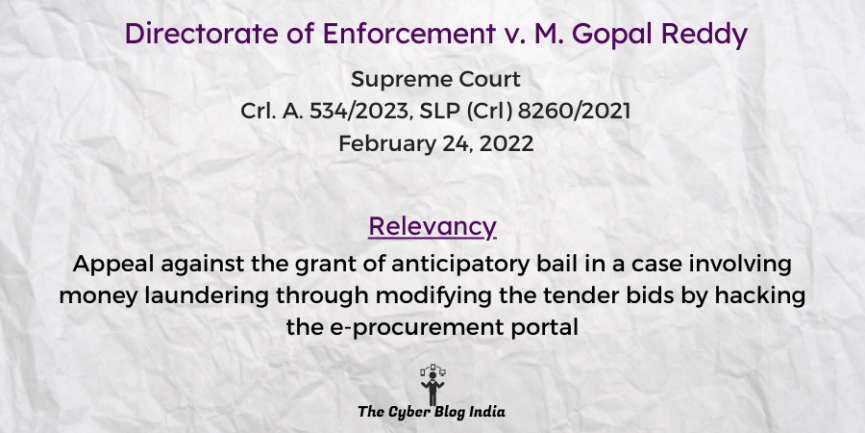Directorate of Enforcement v. M. Gopal Reddy

Directorate of Enforcement v. M. Gopal Reddy
In the Supreme Court of India
Crl. A. 534/2023, SLP (Crl) 8260/2021
Before Justice M.R. Shah and Justice C.T. Ravikumar
Decided on February 24, 2022
Relevancy of the Case: Appeal against the grant of anticipatory bail in a case involving money laundering through modifying the tender bids by hacking the e-procurement portal
Statutes and Provisions Involved
- The Prevention of Money-Laundering Act, 2002 (Section 3, 4, 13(2), 17(1), 45)
- The Indian Penal Code, 1860 (Section 120B, 420, 471)
- The Code of Criminal Procedure, 1973 (Section 438)
Relevant Facts of the Case
- The High Court of Telangana granted anticipatory bail to the respondent earlier. The agency was not satisfied with the High Court’s order, so it has challenged the same before the Supreme Court.
- The preliminary investigation has revealed the respondent’s role in manipulating and tampering with e-tenders. However, the FIR did not initially name the respondent.
- A search of his office and residence revealed several incriminating documents and digital evidence.
Prominent Arguments by the Advocates
- The appellant’s counsel argued that the High Court had erred in not applying Section 45 of the Prevention of Money-Laundering Act, 2002 while dealing with the respondent’s anticipatory bail application.
- The respondent’s counsel contended that Section 45 was not applicable in the present case. The court had previously discharged other accused persons in the present case.
Opinion of the Bench
- The anticipatory bail proceedings will fall under the provisions of Section 45 of the Prevention of Money-Laundering Act, 2002.
- The High Court failed to understand the seriousness of the offence. It made an error while granting the anticipatory bail to the accused. Therefore, the said order is unsustainable.
- A court cannot acquit an accused because it discharged all the other accused persons.
Final Decision
- The bench quashed the High Court’s order granting anticipatory bail to the respondent.
